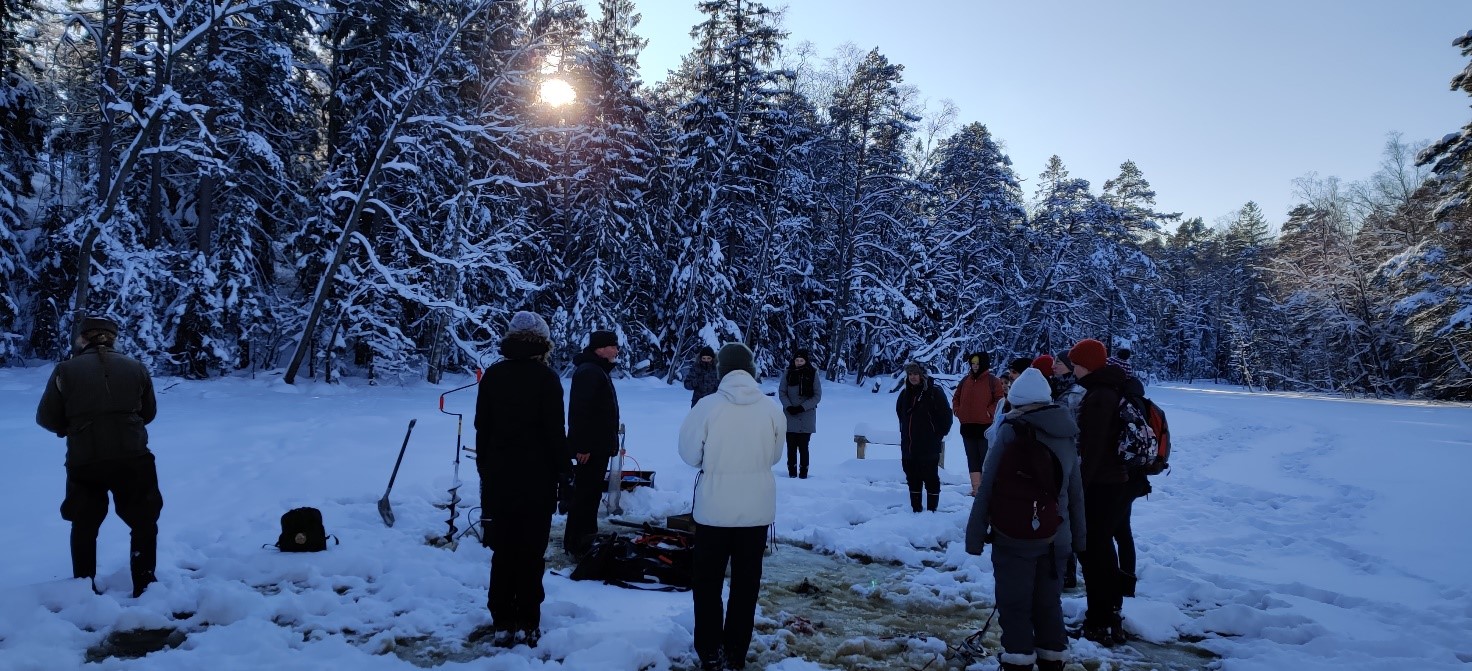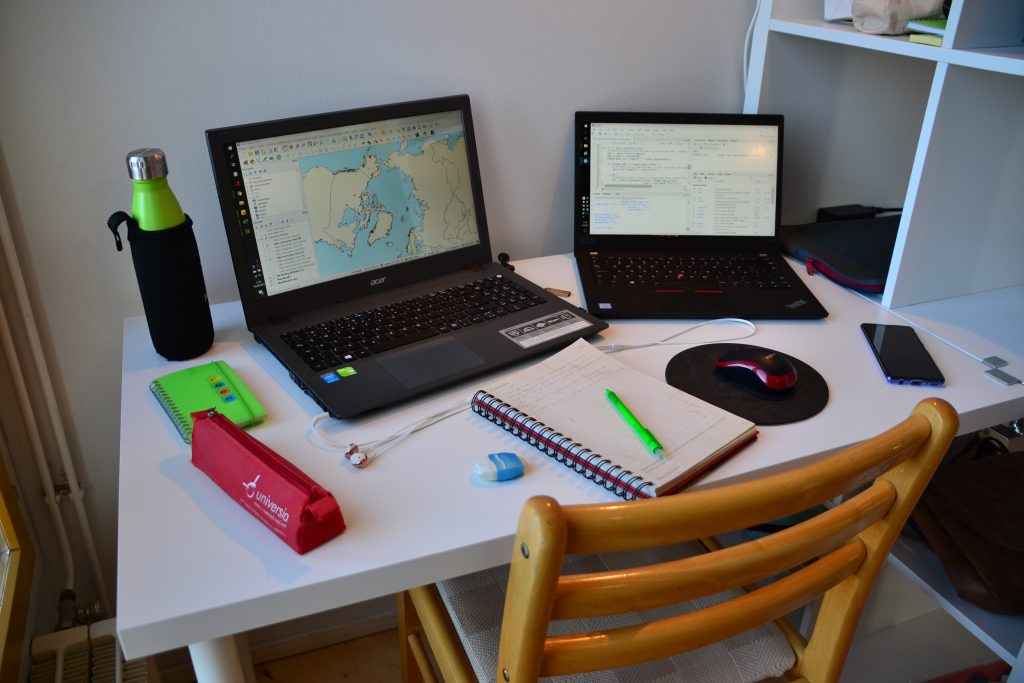by Lilia Orozco
It is almost a year since the COVID-19 pandemic spread globally, but the final repercussions for science will be realized in the years to come. Travel restrictions canceled most planned fieldwork, conferences and research visits, while social distancing changed the way we communicate, plan our activities and interact. How we, as a scientific community, confront the new circumstances has been a subject of conversation from the beginning (1-3).
On March 16, 2020, the Universities in Finland were shut down. Since then, our research group has been managing projects and thesis work from a new angle. I started my PhD research on past northern lake ecosystems in November 2020, amid the exceptional situation. I was prepared for the home office and the uncertainty in field and lab work plans. It helped me to focus on what I can do rather than what I cannot. A pandemic-suited mindset might be easy to set at the beginning of a project, but how has it been for those who made their plans prior to COVID-19? I asked our group.
Most of us had to make arrangements. Maxime Courroux, a Master’s student studying sub-arctic lakes, explains:
“A Master’s thesis is a relatively short project. But within a year, I had to change my topic, re-plan my field schedule, and manage to finish everything on time. While this wasn’t a walk in the park, the shared struggle with peers has led to a lot of support. Nothing went as expected, but it was still fun.”
For Tiia Luostarinen, PhD candidate studying microscopic sea-ice organisms, the closure of universities, and even countries, meant leaving laboratory analyses at a short notice.
“When the pandemic started to spread in Europe, I was in Denmark for some lab work but was supposed to travel back home in a couple of days anyway. When the Danish government announced that they are closing their borders, I changed my flights and returned to Finland. It was hard to miss saying proper goodbyes to everyone in Copenhagen.”
Despite the boost in discoveries and publications about and COVID-19 (4, 5) in the past year, natural sciences looking into equally topical global challenges, e.g. climate change and environmental degradation, have not had that luck (6). Restrictions have forced scientists to re-think their projects and plans. The University of Helsinki closed its facilities, but we have been able to carry out essential lab work under strict regulations.
Maija Heikkilä, the principal investigator of both currently active Academy of Finland funded projects, faces these circumstances head-on:
“Getting a research project funded is always a thrill, and in all honesty, having another research project launched during the global pandemic was equally exciting. There are new questions to be answered, new people to be hired, and due to the pandemic, new implementation plans to be made. This is much easier at the very beginning of the project than in the middle of it, but we have managed all our work rather brilliantly. Our University has been strict but prioritized science where possible.”

Collaboration and exchange of ideas are focal to any research. The social restrictions have forced us to use different technologies (who could have imagined the now-so-routine ZOOM coffees a year ago!). The new ways of communicating are not always ideal, in particular if you have just arrived in a new country. This is the experience of Ana Lúcia Lindroth Dauner, the new postdoc researcher in the team working on integrating and combining paleoecological data. Ana has not even met everybody in the group in person.
“Besides conciliating the time between academic and domestic work, the main issue I have had in starting to work on a project in the midst of the pandemic is the lack of personal contact. The pandemic makes it difficult to get to know new people and, therefore, to share thoughts and ideas.”

We have all coped with the situation that started one year ago in different ways. We have had to find a balance between life and work, transform our homes into offices, and accept new realities that we did not expect. For Master’s student Meri Mäkelä, whose thesis unravels past ecosystem changes in an arctic fjord, staying motivated has helped her finish her project.
“In February 2020 I definitely couldn’t predict that after a year I would still be finishing my Master’s thesis surrounded by the pandemic. No doubt that the pandemic has slowed down my thesis project, but to be honest, my enthusiasm to left no stone unturned should be blamed more. At least I have learned to make less overly optimistic timetables for my projects to come – I hope.”
Confinement is not ideal for everyone, but after a year of this reality, we have modified our practices. Tiia has learned to appreciate the time at home.
“If you would have asked me if I liked working from home a year ago, the answer would’ve been a definite no. But this situation has at least taught me to appreciate the quietness and flexibility of working from home. And obviously, the better coffee.”
Like Tiia, Maija profits from the advantages of telecommuting and stays optimistic.
“The lack of commuting and traveling has brought a new sense of tranquility to daily work tasks and challenged me to develop new ways for team building. I am positive and face challenges that are much smaller than the responsibility of an individual to take part in fighting the global pandemic.”
Indeed, while we look forward to resuming fieldwork and in-person interaction as soon as it is safe, it is good to keep things in perspective. Despite our differing experiences and perspectives from the past year, everyone has surely mastered one thing – to adapt.
—-
Lilia Orozco is a PhD student who celebrates picking the first fossil remains in her lake sediment samples.
List of references:
- Clay RA (2020, March 19). Conducting research during the COVID-19 pandemic. http://www.apa.org/news/apa/2020/03/conducting-research-covid-19
- Pain E (2020, April 17) How early-career scientists are coping with COVID-19 challenges and fears. Science Careers.
- Kupferschmidt K (2020, February 26). A completely new culture of doing research. Coronavirus outbreak changes how scientists communicate. Science News.
- Science in the Wake of the Pandemic: How Will COVID-19 Change the Way We Do Research? (2020). Molecular cell 79:9–10. https://doi.org/10.1016/j.molcel.2020.06.024
- Palayew A, Norgaard O, Safreed-Harmon K, Andersen TH, Rasmussen LN, Lazarus JV (2020). Pandemic publishing poses a new COVID-19 challenge. Nature Human Behaviour 4:666-9. https://doi.org/10.1038/s41562-020-0911-0
- Bian SX, Lin E (2020). Competing with a pandemic: Trends in research design in a time of Covid-19. Plos One 15:e0238831. https://doi.org/10.1371/journal.pone.0238831
